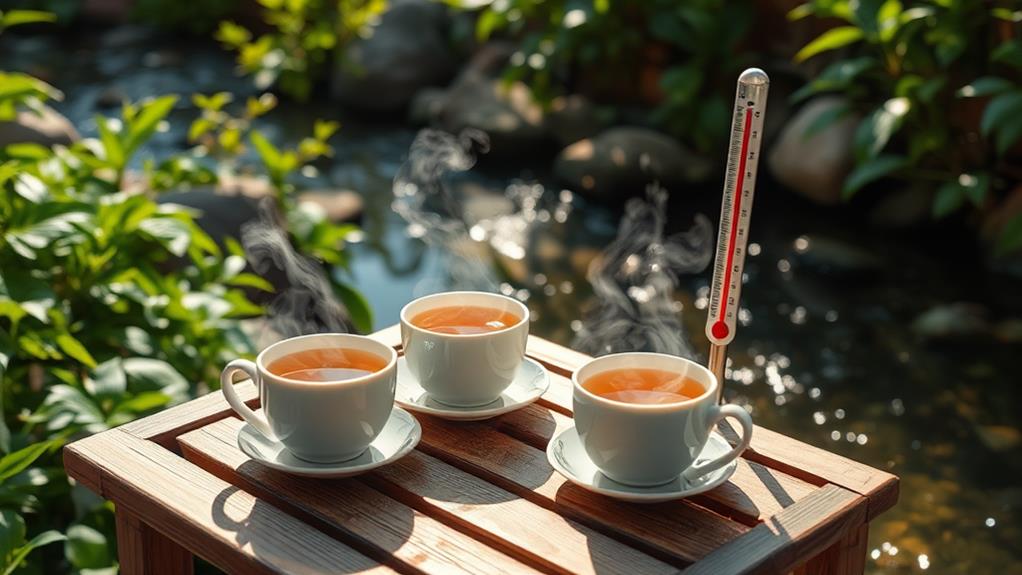Water quality and temperature are key to brewing the perfect cup of tea. High-quality water enhances flavor, while impurities can ruin it. You'll want to choose your water wisely—spring or filtered water works best, whereas tap water might bring unwanted tastes. Temperature matters, too! Green tea brews best at 160°F to 180°F, while black tea needs temperatures between 200°F and 212°F. Balancing mineral content and pH levels in your water also affects sweetness and bitterness. Being attentive to these factors can transform your tea time. Stick around, and you'll discover more tips to elevate your tea experience!
Importance of Water Quality
Ensuring high water quality is crucial for brewing the perfect cup of tea. You mightn't realize it, but the water you use can make or break your tea experience. With seasonal variations affecting water composition, it's essential to adapt your brewing methods.
For instance, in the spring, fresher rainwater might enhance the brightness of your tea, while winter's harder water could dull its flavors. Additionally, many traditional tea ceremonies emphasize the importance of water quality, as it directly influences the final taste and aroma, highlighting the cultural significance of tea in various regions around the world (traditional tea ceremonies).
So, how can you ensure your water is up to par? Water filtration is your best friend. Using a quality water filter can remove impurities, including chlorine and heavy metals, that can interfere with the delicate notes of your tea.
Even a simple pitcher filter can significantly improve your water quality, contributing to a richer taste.
And don't forget to taste-test! Experiment with different water sources throughout the year. You might discover that your favorite tea shines in the summer using filtered tap water, while a springtime brew is best with bottled spring water.
Embracing these variations keeps your tea experience dynamic and exciting. By prioritizing water quality, you're setting the stage for a delightful tea journey that's both innovative and refreshing!
Ideal Water Temperature
The right water temperature can elevate your tea brewing game to new heights. When you brew tea, different types require specific temperature ranges to unlock their full flavor potential. For instance, green tea thrives at 160°F to 180°F, while black tea prefers a hotter range of 200°F to 212°F.
If you're using brewing methods like steeping or cold brewing, knowing these temperatures can transform your experience. Imagine steeping a delicate green tea in boiling water; it might taste bitter instead of refreshing. To avoid this, be mindful of your water temperature and adjust accordingly.
Using a thermometer can help, but you can also rely on your senses. If you see tiny bubbles forming at the bottom of the kettle, you're likely in the right range for green tea!
For oolong tea, aim for 190°F to 200°F, and for herbal teas, you can go all out with boiling water. Each temperature range brings out unique flavors, so don't hesitate to experiment.
With practice, you'll discover the perfect balance for your taste buds, transforming your everyday tea into an extraordinary ritual. So grab your kettle, and let's get brewing!
Impact of Mineral Content
Water temperature isn't the only factor that influences the taste of your tea; mineral content plays a significant role too.
The minerals in your water, like calcium and magnesium, contribute to what's called mineral balance. This balance directly affects how you perceive the taste of your tea. Too much or too little of certain minerals can change everything!
When you brew your tea, these minerals interact with the compounds in the leaves, shaping your overall taste experience.
For example, a higher calcium content can enhance sweetness, making your tea feel rounder and more satisfying. On the other hand, if your water is too soft, lacking essential minerals, you might find your tea tasting flat and unexciting.
Ph Levels and Flavor
Many tea enthusiasts might not realize that pH levels in water can dramatically influence the flavor of their brew. Understanding the pH balance is crucial, as it directly affects the acidity levels and the overall flavor profile of your tea. When you brew tea, the water's pH interacts with the tea leaves, impacting taste perception and tea extraction.
Here's a quick look at how different pH levels can alter your tea's sensory experience:
| pH Level | Flavor Profile |
|---|---|
| 6.0 | Balanced, mild sweetness |
| 6.5 | Bright, floral notes |
| 7.0 | Neutral, clean taste |
| 7.5 | Slightly bitter, earthy |
| 8.0 | Harsh, diminished flavors |
A well-balanced pH enhances the brewing chemistry, allowing you to unlock the health benefits and full potential of your tea. When you dial in the right acidity, you create a delightful taste experience that elevates every sip. Experiment with various waters to see how pH levels transform your favorite blends. Your palate will thank you for it!
Water Sources and Their Effects
The water source you choose can really change the flavor of your tea.
Different sources have unique mineral contents, which can either enhance or mask the tea's natural taste.
Source Impact on Flavor
Different sources of water can significantly influence the flavor profile of your tea. When you brew your favorite blend, the water source you choose can make a world of difference.
For example, spring water often brings a crisp, refreshing taste, while tap water might introduce hints of chlorine or other treatments that could muddle those delicate flavors.
If you're feeling adventurous, experimenting with different water sources could lead to exciting discoveries in flavor profiles. Consider using filtered water to remove impurities or even trying bottled water from unique springs to see how it enhances your tea.
Each water source carries its own characteristics, which can amplify or diminish the natural notes in your tea leaves.
Even distilled water, known for its purity, might strip away some of the essential flavors, leaving your tea flat.
So, whether you're sipping a bold black tea or a delicate green, your choice of water can elevate or hinder your experience.
By paying attention to your water source, you're not just quenching your thirst; you're crafting a tea experience that's uniquely yours.
Get ready to explore how each sip can surprise you!
Mineral Content Variations
While you mightn't think about it, the mineral content of your water can drastically affect the taste and quality of your tea. Different water sources bring unique mineral types, which can change how your tea tastes. For instance, water high in calcium and magnesium can enhance the flavor, while overly soft water might leave your brew tasting flat.
Achieving the right mineral balance is crucial for the best tea experience. When you steep your tea, these minerals interact with the compounds in the leaves, influencing the aroma and flavor. If your water is too hard or too soft, it can overshadow the delicate notes you're trying to savor.
Experimenting with various water sources can lead to exciting discoveries. You might find that spring water gives your green tea a refreshing zing, while filtered tap water produces a smoother black tea.
Don't shy away from trying different bottled waters, either! Each one will bring its own unique mineral types to the table, enhancing or altering your tea experience.
Brewing Techniques for Best Results
To brew the perfect cup of tea, you need to pay attention to a few key techniques that can elevate your experience.
First, consider your brewing methods. Whether you opt for a teapot, French press, or a simple tea infuser, each method brings out unique flavors.
Next, focus on steeping times. Different teas require different lengths of time to release their full potential. For instance, delicate green teas may need just two to three minutes, while robust black teas can steep for four to five minutes.
Experimenting with these variables can lead to delightful discoveries. You might find that a few extra seconds can transform your tea from ordinary to extraordinary.
Also, don't forget about the water temperature; it's crucial! Hotter water generally suits black and herbal teas, while cooler water works well for greens and whites.
Lastly, remember to keep your tea leaves fresh. Storing them in an airtight container away from light will maintain their potency.
With a bit of practice and these techniques in mind, you're well on your way to crafting an innovative and enjoyable tea experience every time!
Happy brewing!
Experimenting With Water Variations
Water plays a crucial role in the flavor profile of your tea, so experimenting with different water variations can lead to exciting results.
Start by considering the type of water you use. Tap water might've a strong taste, while distilled water can be too flat. You'll want to find a balance that enhances your tea's unique characteristics.
One way to innovate is by exploring water filtration systems. Using a good filter can remove unwanted minerals and chemicals, allowing your tea's natural flavors to shine.
Try comparing filtered water with spring water to see how each impacts your tea's taste profiles. You might discover a new favorite!
Temperature also matters. If you're using hard water, for example, it might throw off the balance of flavors.
Experimenting with various water sources not only changes the taste but can elevate your entire tea experience.
Don't hesitate to mix things up—add a splash of mineral water for depth or try different brands of bottled water.
Each variation can reveal a new layer of flavor, making your tea adventure truly unique. Happy brewing!
FAQ
How Does Water Hardness Affect Tea Flavor?
When you brew tea, water hardness influences the mineral balance, which in turn shapes the flavor profile. A well-balanced mineral content can enhance the nuances, leading to a more vibrant and innovative tea experience.
Can Bottled Water Improve Tea Quality?
Did you know 60% of tea enthusiasts believe bottled water enhances flavor? By using bottled water, you can unlock unique brewing techniques, enjoying its benefits like mineral balance, which elevates your tea experience to new heights.
What Role Does Chlorine Play in Brewing Tea?
Chlorine impacts your tea aroma significantly. It can mask delicate flavors and aromas, leading to an unbalanced brew. By reducing chlorine, you'll enhance your tea experience, allowing the true essence of your leaves to shine through.
Is Tap Water Safe for Brewing Tea?
"Better safe than sorry," you think. When it comes to tea brewing, tap water can be safe, but its quality varies. Always check for contaminants, and consider using filtered water for an innovative brewing experience.
How Does Altitude Influence Water Boiling Temperature?
Altitude affects the boiling point of water because higher elevations decrease atmospheric pressure. You'll notice that water boils at lower temperatures, which can impact cooking and brewing techniques, requiring adjustments for optimal outcomes in innovative culinary experiences.
Final Thoughts
In the world of tea, water is more than just a base; it's the unsung hero of flavor. By paying attention to water quality, temperature, and mineral content, you're setting the stage for a delightful brew. Experimenting with different water types can transform your tea experience, making each cup unique. So, don't just boil water—give it the spotlight it deserves. Your taste buds will thank you for the delicious journey ahead!




Pingback: What's The Difference Between Decaf and Caffeine-Free Tea? - TeaKram
Pingback: Ice Wine Tea - Tea Made With Frozen Grape Wine - TeaKram